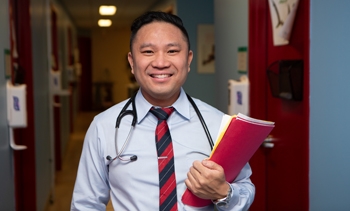Review explores best practices for supporting youth with gender dysphoria

By Michael Oliveira

Dr. Joseph Bonifacio
With a growing number of young people seeking care for gender dysphoria, primary care providers should be preparing for how to help support this vulnerable population, says St. Michael’s Hospital’s Dr. Joseph Bonifacio.
A review co-authored by Dr. Bonifacio in CMAJ (Canadian Medical Association Journal) calls for a “thoughtful, affirming, well-reasoned individualized approach that attempts to maximize support … as youth and their caregivers make complex and difficult decisions.”
“Transgender care has benefited greatly from detailed guidelines but practice is hampered by knowledge gaps,” says Dr. Bonifacio, who works in the St. Michael’s pediatrics department.
The article defines gender dysphoria as “the distress experienced by an individual when their gender identity and their gender assigned at birth are discordant.”
Studies from other countries have estimated that between 1.2 per cent to 4.1 per cent of adolescents may identify as a different gender identify from their birth gender.
“Ideally, the approach to youth with gender dysphoria revolves around collaborative decision-making among the youth, family or guardians, and care providers,” writes Dr. Bonifacio. “The youth’s voice is always paramount.”
Dr. Bonifacio advises that other primary care providers can help their young patients by asking questions about gender in an inclusive way that treats them with respect.
“Know your adolescents by spending time with them and understanding their lived experience and how such experiences have affected the way they understand their gender and what is going on now,” he says.
“Adolescents with gender dysphoria present in different ways. Some may overtly state they are transgender. Others may present to their primary care provider with a mental health issue such as anxiety or depression. Others may have difficulty in school.
“So the only real way we can understand what the youth is going through is to make sure that we ask these questions and connect them with providers that can give them appropriate care.”
About St. Michael’s Hospital
St. Michael’s Hospital provides compassionate care to all who enter its doors. The hospital also provides outstanding medical education to future health care professionals in more than 29 academic disciplines. Critical care and trauma, heart disease, neurosurgery, diabetes, cancer care, care of the homeless and global health are among the Hospital’s recognized areas of expertise. Through the Keenan Research Centre and the Li Ka Shing International Healthcare Education Centre, which make up the Li Ka Shing Knowledge Institute, research and education at St. Michael’s Hospital are recognized and make an impact around the world. Founded in 1892, the hospital is fully affiliated with the University of Toronto.
About Unity Health Toronto
Unity Health Toronto, comprised of Providence Healthcare, St. Joseph’s Health Centre and St. Michael’s Hospital, works to advance the health of everyone in our urban communities and beyond. Our health network serves patients, residents and clients across the full spectrum of care, spanning primary care, secondary community care, tertiary and quaternary care services to post-acute through rehabilitation, palliative care and long-term care, while investing in world-class research and education. For more information, visit www.unityhealth.to.
